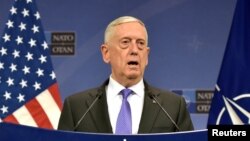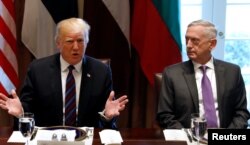For two years, U.S. Defense Secretary Jim Mattis has been urging nervous NATO counterparts to judge the Trump administration by its actions and not by the president's tweets or off-the-cuff remarks. But on Thursday, President Donald Trump posted a tweet the Europeans couldn't ignore: an announcement that the four-star general would soon be leaving the Pentagon.
The tweet wasn't altogether a surprise, coming a day after Trump ordered U.S. ground troops out of northern Syria, but it has shocked America's traditional allies, who like Mattis are eager to preserve the U.S.-European alliance. In the Marine general they had a partner they trusted and who they believed helped temper an unpredictable U.S. leader.
A British defense minister was among the first to react publicly to the departure of Mattis. "Very sorry to see Jim Mattis stepping down," Tobias Ellwood tweeted. "Trusted, respected and admired by friends and allies. Feared and revered by our foes. The most impressive military mind I've had the honor to know. Jim, my friend — our world will be less safe without you."
Mattis has especially close ties with the top ranks of Britain's military establishment, deepened during the Persian Gulf War, in Afghanistan, and again in 2003 in Iraq. For the British — as well as America's other European allies — the 68-year-old Mattis was seen as someone they could turn to in order to get their views across to the Trump White House and as a steady hand who might be able to restrain a president who has questioned the very value of the Atlantic alliance, several European military officials said.
On a tightrope
That placed Mattis on a tightrope, testing him all the time. On issue after issue, Mattis was at odds with his boss — on whether torture should be used again on terror suspects, over what strategy the U.S. should pursue in Syria, whether the U.S. military presence should be ended or reduced in Afghanistan, and what posture should be adopted toward an increasingly aggressive Russia and an assertive China. And above all, how to conduct relations with the NATO allies.
Mattis made clear in his resignation letter Thursday the differences he has had with Trump, highlighting his belief in the importance of NATO and America's traditional allies.
"One core belief I have always held is that our strength as a nation is inextricably linked to the strength of our unique and comprehensive system of alliances and partnerships," Mattis wrote. "While the U.S. remains the indispensable nation in the free world, we cannot protect our interests or serve that role effectively without maintaining strong alliances and showing respect to those allies."
U.S. relations with Europe are at their lowest ebb in the history of NATO after a series of acrimonious encounters between Trump and European leaders. His episodic outspoken criticism of NATO allies has echoed across the continent.
Earlier this year, Trump suggested he might cut U.S. force levels in Europe if the allies didn't boost their military spending. "They kill us with NATO," Trump during a speech in Montana. "They kill us."
His suggestions in the past that he might recognize Moscow's annexation of Crimea and his downplaying Russia as threat, as far as they see it, has only added to their alarm about whether America is still committed to collective defense.
Behind the scenes, Mattis calmed European fears and smoothed ruffled feathers. The Europeans "trust Mattis," according to Nicholas Burns, a retired U.S. diplomat and former envoy to NATO. "They don't trust Trump."
Embodiment of continuity
European military officials said they saw him as the embodiment of continuity in U.S. defense policy in an otherwise unpredictable administration and were comforted by Mattis' insistence he wouldn't resign. But fears had been growing among his NATO counterparts for the past few months he might go, and European officials said they had felt his influence was declining, with the initial signs coming as his allies in the administration were sidelined.
Speaking to British television, Karin Von Hippel, the director of Britain's Royal United Services Institute, an influential think tank, said Mattis' departure was "very concerning" and a "huge deal." Von Hippel said he was the man "everyone was relying on to keep the lid on things."
Mattis' departure has added to growing European alarm. This week, America's European allies felt blindsided by the abrupt changes. The allies, who also have troops in northern Syria operating in partnership with U.S. special forces, were not consulted before Trump decided to pull out the troops. Neither were the Kurdish-led Syrian Democratic Forces, who have been doing the toughest fighting against the Islamic State terror group.
Washington and defense policymakers at NATO headquarters differ sharply in their assessments of the prospects of an IS resurgence. British and French officials have contradicted Trump's claim to have defeated IS in Syria. And for those officials, the U.S. leader's plans to halve the U.S. troop presence in Afghanistan are especially jarring, as the Western mission there is officially a NATO one.
NATO officials are being careful not to widen the strategic differences with Washington by making public comments. NATO spokeswoman Oana Lungescu has been referring reporters to U.S. authorities for comment on the White House plan to reduce the number of American troops in Afghanistan.
Officials say NATO Secretary-General Jens Stoltenberg has spoken by telephone with U.S. Secretary of State Mike Pompeo about both Syria and Afghanistan, and U.S. officials maintain that Washington "remains committed to the Alliance and to working with allies to deter our adversaries and defend our citizens."







